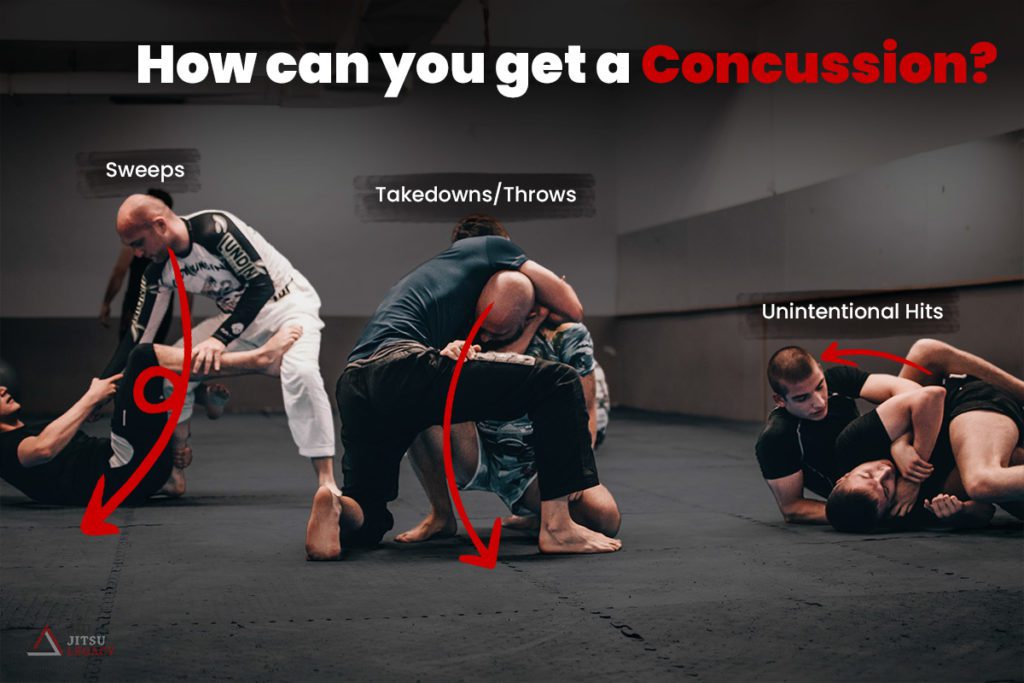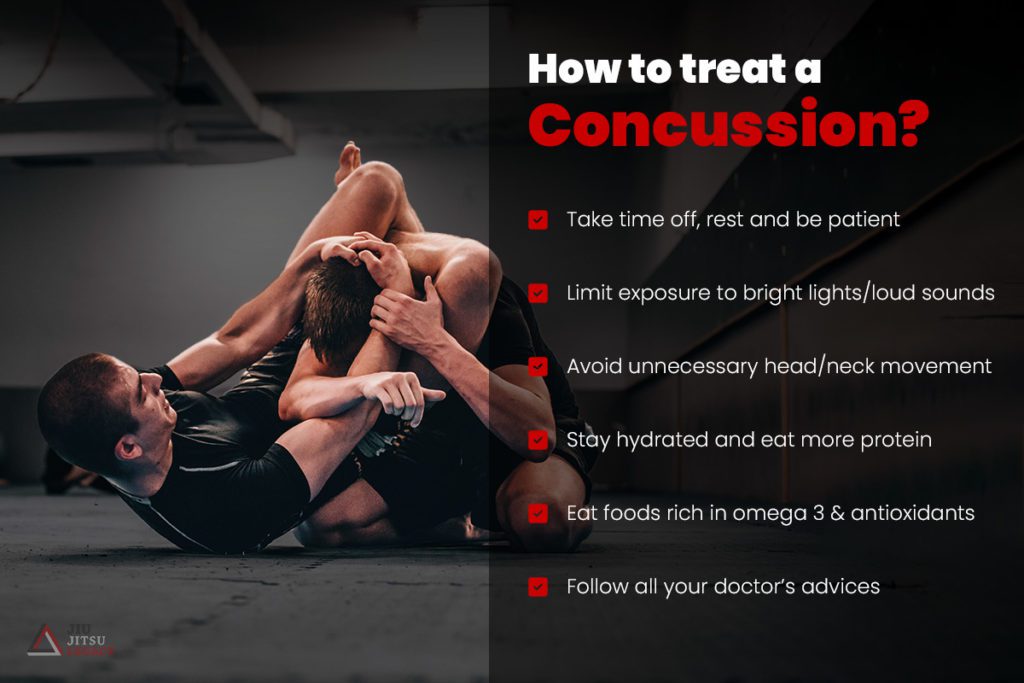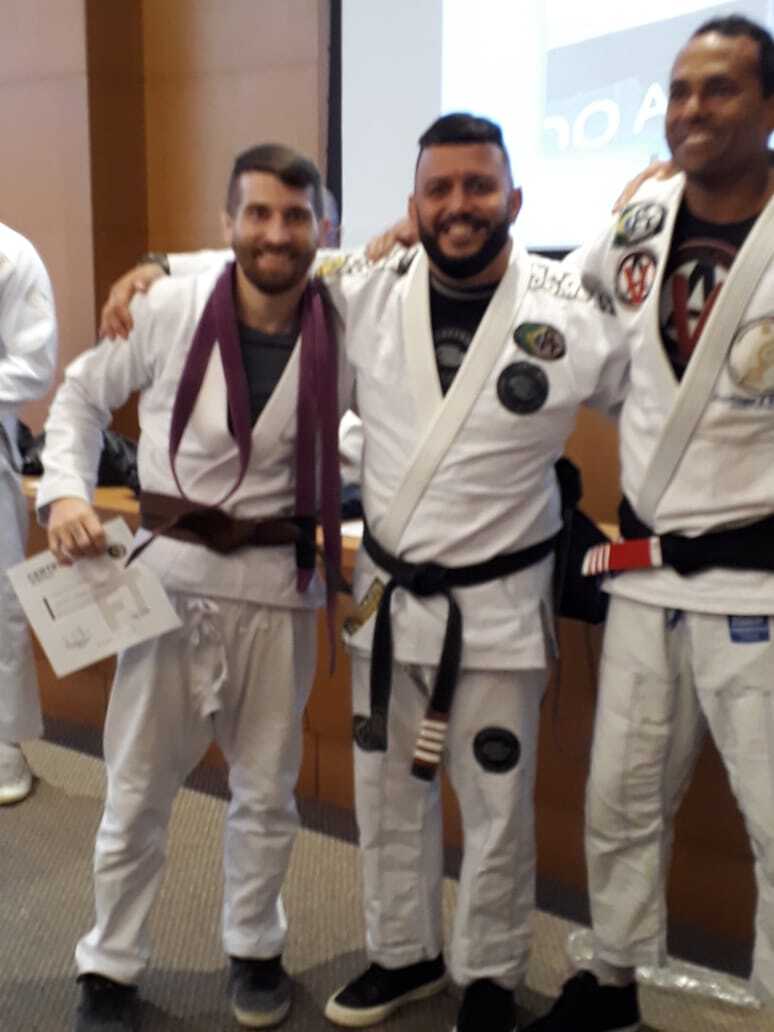Many BJJ practitioners think that just because there’s no striking in Jiu Jitsu, there’s no threat of concussions. Unfortunately, that idea couldn’t be more wrong.
BJJ is a combat sport and there is always a risk of concussions whenever you’re training. That’s why we’ve put together this article on concussions and BJJ.
This article will cover concussion symptoms in adults and kids along with how to deal with a concussion. We also answer if mouthguards can really prevent concussions.
How can you get a concussion in BJJ?
Even though there are no strikes allowed in BJJ, there is still a slight risk of getting a concussion. There are specifically three ways that you can get a concussion in BJJ.

Takedowns/Throws
Getting dropped on your head or getting slammed off a takedown or throw can lead to a concussion. This, along with spinal injuries, is why slamming and dropping an opponent on their head is illegal in most BJJ competitions.
Sweeps
If you’ve ever been taking off your feet from a sweep, then you’ve may have taken a hard fall. If your head struck the mat, you may have even gotten a mild concussion in the process!
Unintentional hits
Rolls can get rather intense and accidents can happen. This is especially true if you’re rolling with a spazzy white belt!
Sooner or later you will catch an accidental knee, elbow, or headbutt from a training partner. These unplanned boxing matches can leave you with a shiner or even a concussion.
Are concussions unnoticed in BJJ?
Concussions are a bit of a dirty little secret that goes unnoticed in BJJ. If you ask the head of a gym what their concussion protocol is, they’ll probably give you a blank stare.
It is more than likely that most of us that train have gotten our bell rung at one point. We more than likely just shook it off and kept training, not worrying if we could’ve possibly received a concussion.
Concussion symptoms in adults and kids
Adults and kids have different concussion symptoms from each other. The symptoms may appear right after the impact, or develop over 24-48 hours following the hit. Anytime someone is knocked unconscious by an impact, a concussion should be assumed to be present.
Here is a list of concussion symptoms in both adults and kids that you should be mindful of.
Concussion symptoms in adults
- Headache
- Sensitivity to light
- Difficulty balancing
- Nausea
- Vomiting
- Confused
- Change in mood
- Trouble concentrating
Concussion symptoms in kids
Kids with concussions may have some of the same symptoms as adults, but also show concussions with symptoms that include:
- Dizziness
- Fatigue
- Headache
- Irritability
- Slurred speech
- Difficulty sleeping
A child with a concussion is far more severe than an adult with a concussion. If you suspect your child or student may have a concussion, you should take them to the hospital immediately.
The CDC offers a free concussion awareness program for youth coaches called Heads Up. We highly recommend anyone who works with kids take a few hours to go over this material.
Can being choked out give you a concussion?
You can’t get a concussion from being choked out, but being choked out can lead to its own sort of damage. When you get choked out, the flow of blood and oxygen get cut off, which are the brain’s nutrients. If a choke is held long enough, this can result in brain damage. This is very uncommon, but is not unknown.
If you get choked out long enough, it can lead to severe brain damage or even death. That is why you always need to swallow your pride and just tap if you can’t escape a choke. If you’re applying a choke and your opponent stops resisting, either stop and assess if they’re still conscious or ask them if the choke is on. If they do not reply, stop the choke immediately.
How to treat a concussion?
If you receive a concussion in BJJ training, the best thing you can do is take time off. Many health websites recommend at least ten days of no training after a mild concussion.

During this time, you should also avoid any extraneous activity. Try to stay home and rest until you feel well enough to get back on the mats.
This may feel like a long time, but successive concussions pose greater risk of long-term injury, and this risk needs to be avoided!
Can wearing a mouthguard prevent a concussion?
Many believe that mouthguards can be used as a preventative against concussions. The science behind that so far has been inconclusive, but it’s better to be safe than sorry.
Check out our article on some of the best mouthguards for BJJ. They’ll for sure prevent you from having to get expensive dental work done.
Can I train with a concussion?
Honestly, you should not train if you had just recently received a concussion.
After ten to fourteen days, you should be good to train. When you return to the mats, you should probably start with light training or drilling and avoid hard rolls. If concussion symptoms return, dial back your intensity and try again in a few days.
How to avoid getting a concussion in BJJ?
If you want to avoid getting a concussion in BJJ, you can do two things to avoid them. You can either work on your breakfalls and/or roll more methodically.
Drill breakfalls
To ensure that you don’t fall on your head or take a hard fall, you should always routinely drill breakfalls. It may seem like something that isn’t worth your time, but taking a minute to drill breakfalls to avoid concussions.
Roll methodically
Being more methodical when you roll is something you learn when you get more experience from consistently training. By being more methodical when you roll, your movements will be less spazzy and more fluid. This will drastically decrease the chances of getting a concussion when rolling.
Be more mindful of concussions
Just because you train in a non-striking martial art like BJJ doesn’t mean that you can’t get a concussion. You should always be more mindful of the risks of concussions during BJJ training. Once you take the proper precautions, you’ll be able to keep training and be worried about getting a concussion from training.

